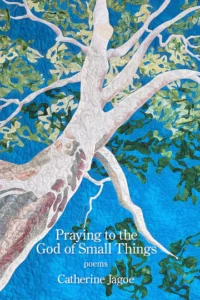 Review by Rebecca Jane
Review by Rebecca Jane
With Praying to the God of Small Things, Wisconsin-based poet, Catherine Jagoe pays homage to Earth’s aliveness, within its microcosmic realms—here, insects reveal their ingenuity, and laced wings beguile the witness. These poems urge us to marvel at, say, those multiple eyes on the tiniest of creatures; relish insect wing patterns and mating behavior. Jagoe’s precise lyricism inspires readers to delight in moss, beetles, moths, feelers, mandibles—meet tiny beings on their turf.
Catherine Jagoe—also the author of Blood Root, which won several awards, News from the North, and Casting Off—remains true to her gifts: her poems resonate deep within the human psyche to evoke awe, sadness, grief, shame, hope, discernment, and compassion.
“Sermon from the Marsh” reveres muskrats and their dying habitat. “Whisper, Universe, Eclipse” speaks the names of vanishing species of moths. “Praise Song for a Plane Tree” features a voice, ravished by tiny life, asking directly for the tree to bestow its teachings. These poems are proof that the life force moving through insects and trees moves us all. Observing tiny life gives human beings expanded perception that helps us cultivate more refined sensitivity and ecological consciousness. Watch Darkling Beetles of the Namib Desert drink fog! Taste frost on apples. Know Earth teems with life. To walk more gently on the planet, Jagoe’s poems suggest, simply, quietly observe closely.
Part One contains character poems: a child copes with trauma—after she is ridiculed by classmates, she retreats and discovers a sense of belonging to the moss that grows over a wall in her yard. This child’s keen observation skills infuse the whole poetry collection with the spirit of childlike wonder. In Part Two, a naturalist observes tiny things as though they are friends: moments, insects, sunlight, dust, the fragrances of wings. When observations are motivated by wonder and friendship, they become acts of reverence towards Earth. The payoff for the observer is pure delight. Stunning photos accompany the poems. In Part Three, desert, meadow, fog, yellow warbler, honey, sky, stars are all utterly absorbed into the poet’s being, as if to sing: we are how we see!
However, there are poems such as “Dog on the Median of the Kennedy Expressway, Chicago,” which conjure urgency and vulnerability. Heeding this vulnerability leads us to develop that naturalists’ gaze. Zooming in on the bee’s nectar dance helps us embrace humility, longing, and colors that inspire soul-satisfying awe. Urgency looms large because here comes the gardener, wielding her pesticides!
These are poems to read when we have grown too enamored with human craft. It’s true; taking a close look at nature’s craft demands a brave heart because there is grief here. Billions of bird species have perished; what can we learn from them:
When birds die, they like to do it
secretly. It’s rare to see their bodies;
even a holocaust of billions leaves
no mark, no mounds of carcasses. (41)
Not only pay closer attention to species that are dying off, but repeat extinct species’ names. Grieve them openly. Listen. Be with them, knowing we share their fate.
The contradictory poem “Leafhopper Search” features an average gardener doing a google search on how to get rid of leafhoppers; lines like “do leafhoppers bite humans?” (67) are interlaced with poetic lines from the perspective of a naturalist who is praising that same insect’s colors, “cerulean slashed with scarlet,” wondering at “such profligate color” in a “speck of life” (67). In this world, how shall gardener, naturalist, and leafhopper reconcile?
This is a question that brings us to our knees, and we become the naturalist:
On “Weekends he soothes by searching for insects, the tinier the better / Magnified by his zoom lens the minute becomes miraculous” (49).
The naturalist is on his knees, head
to the ground, rump in the air
as if in Child’s Pose, his absorption
a kind of adoration. He is
prostrate for his devotions,
praying to the god of small things (49).
A reader comes away with a renewed relationship to all things microscopic: “How not to worship a world in which / beech aphids boogie? How not to be humbled, how not / to get high on the sheer goddamn weirdness of this world” (91). This stunning collection of poems is unforgettable and deserves to be enjoyed alongside other great works that help refine humanity’s ecological consciousness.
Praying to the God of Small Things by Catherine Jagoe
Kelsay Books, April 2024, 110 pages, $23, paper
ISBN: 9781639805570
Rebecca Jane is the author of She Bleeds Sestinas, which was a finalist for a Best Book Award in 2023. She works as a book reviewer, ghostwriter, and poet who travels to Asia to study yoga, Sanskrit, and Mandarin. She lives with her daughters on unceded Kumeyaay land. (San Diego, California).
